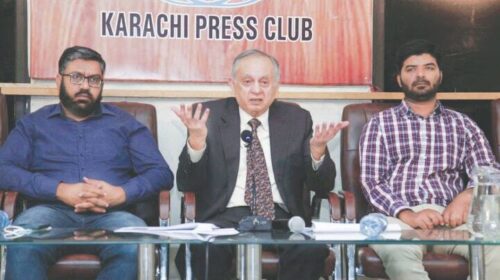Adviser to the Prime Minister on Commerce, Textile, Industry and Production Abdul Razak Dawood has said he’s “worried” the ongoing gas shortage may slow down the pace of exports’ growth in December and beyond.
Speaking to journalists at the Karachi Press Club on Wednesday, Mr Dawood said industrial units, particularly in the textile industry, that have combined-cycle captive power plants will continue to get uninterrupted gas supplies. These are the efficient power plants that route the heat generated by the gas turbine to a separate steam turbine that produces extra power.
However, industrial units that use simple-cycle captive power plants to produce only electricity will face “some” curtailment in gas supplies. “I don’t know the extent of the curtailment.”
Exports of goods amounted to $25.3 billion in 2020-21, up 18.3 per cent from a year ago. They fetched $2.4bn in October, up 17.3pc from the comparable month of the preceding year.
“We’re expecting total exports of $38.7bn in 2021-22, with the share of services at $7.5bn. The export target for the textile sector alone is $20bn,” he said, adding that the country is “exactly on target” so far this fiscal year.
The Ministry of Commerce is pinning its hopes for a 30pc rise in total exports on the IT sector, which recorded a 47pc increase in foreign sales in 2020-21. In the first four months of this year, the increase in IT exports has been almost 45pc. “We’re targeting a jump of up to 70pc in IT exports this year,” he said.
The government will reduce import duties on industrial raw material in the next budget, the commerce adviser announced. “We’ve reduced import duties on raw materials in each of the last three budgets. About 40pc of our raw material imports are already at zero per cent duty.”
Pakistan collects as much as 47pc of its total revenues by taxing import activity. The corresponding share of import-related duties in total revenues for the “Western countries” is as low as 5pc, he said. “It’s 27-28pc for Bangladesh and India,” he added, noting that heavy taxation at the import stage leaves the exchequer with a lower collection at the sales stage.
Mr Dawood said his ministry is actively seeking to grow the exports of non-traditional goods like pharmaceutical and chemical products to non-traditional markets like Africa and Central Asian Republics. Such exports have gone up 77pc in the first four months of this fiscal year, he said. Exports of traditional products to non-traditional markets also increased 60pc over the same period, he added.
The commerce ministry is coming up with a new set of incentives for textile exporters that go into ladies’ and children’s products, which have higher profit margins, and ship them to African countries and Central Asian Republics.
He announced Pakistan will start exporting rice to Iran in a couple of months and import liquefied petroleum gas in return. “This trade will take place in the form of barter under a private arrangement and involve no banking channels,” he said.
Mr Dawood said Chinese companies investing under the China-Pakistan Economic Corridor are not export-oriented and intend to serve the local market instead. As for the free trade agreement (FTA) with China, he said the original agreement was unfavourable to Pakistani businesses. “FTA II is better and our exports to China are now moving up. You’ll see our exports to China will soon be in the same bracket,” he said while referring to Pakistan’s sizable exports to the European Union and the United States.





